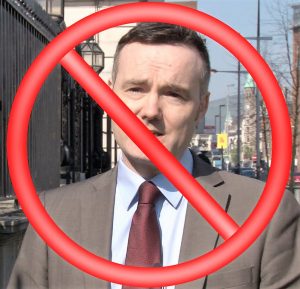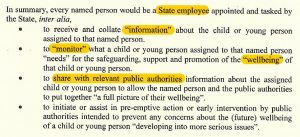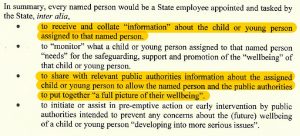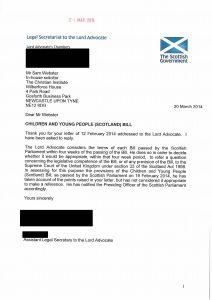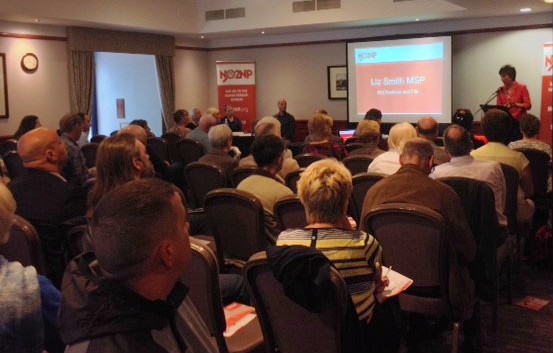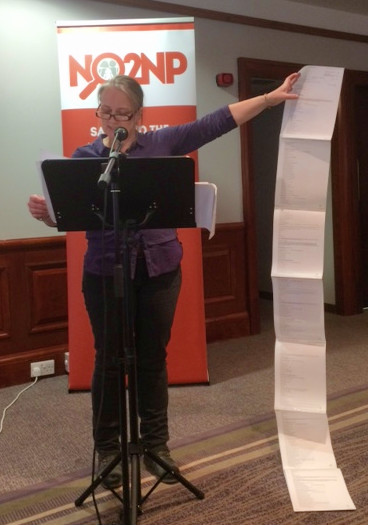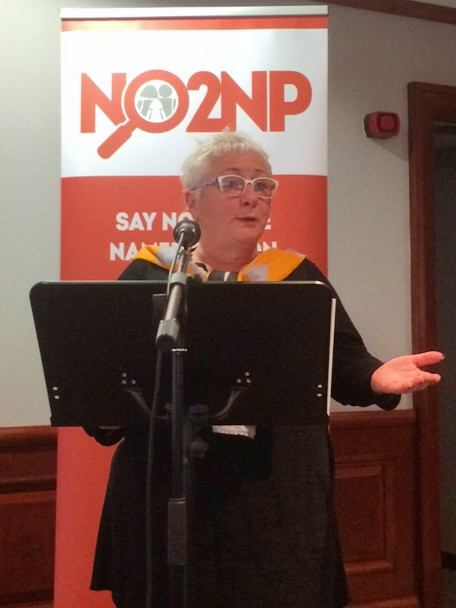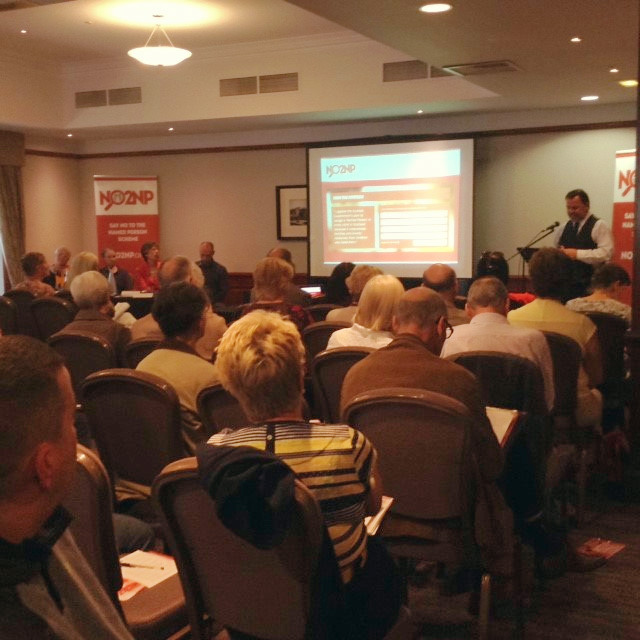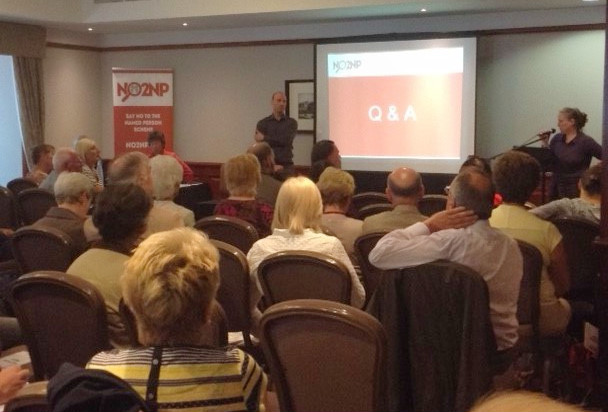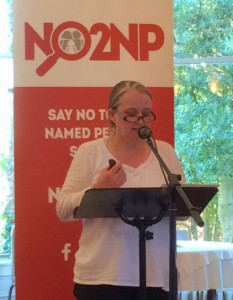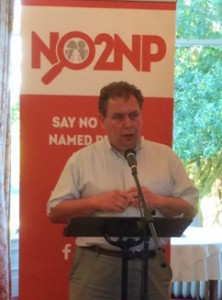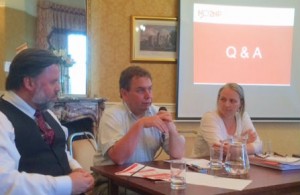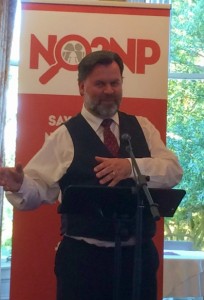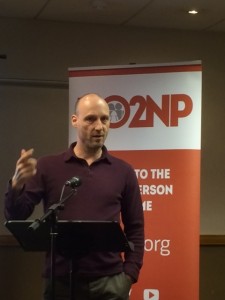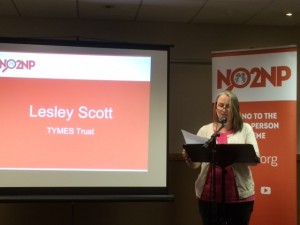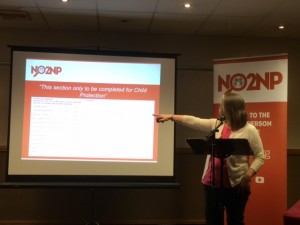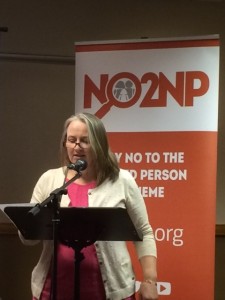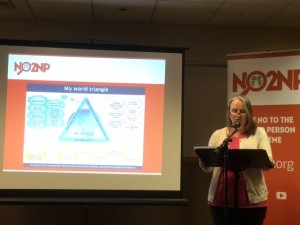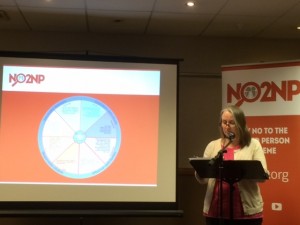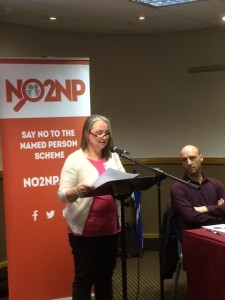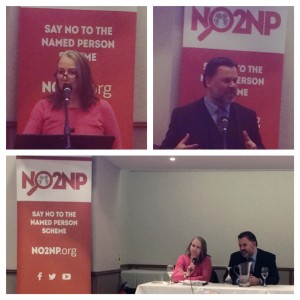Blog
Keeping you up to date on the progress of the Named Person scheme and the NO2NP campaign.
Swinney leaves NO2NP’s campaign spokesman out in the cold
Posted 9 years agoThe Deputy First Minister and Education Secretary John Swinney put a ban on NO2NP’s campaign spokesman Simon Calvert from attending a meeting of third sector groups to discuss the future of the Named Person scheme.
The talks were held as part of an “engagement process” session in Edinburgh on 1 December, to discuss possible ways of changing the scheme following the Supreme Court defeat earlier this year.
But The Christian Institute, a lead party in the legal case, and which helped spearhead the formation of NO2NP, was told its presence would not be welcome at the meeting.
The brush off was contained in an email from a Scottish Government official which stated:
“The aim of the engagement process is to adequately, properly and fully address the issues that were raised in the Supreme Court judgment, and we are engaging widely on those questions.
“However we are not discussing the principle of the Named Person policy as the Supreme Court found it to be legitimate and benign.
“Your organisation has made it clear that it is against the provision of Named Persons, so there is a fundamental policy disagreement.
“The Scottish Government are engaging with people who wish to improve the legislation not those who wish to revisit a debate on its establishment as this has been agreed by Parliament.
“If you would however like to provide your views on the issues raised by the Supreme Court judgment, I attach the engagement discussion paper for your comment.”
Simon Calvert of The Christian Institute, who has been a regular spokesman for NO2NP, said:
“The Government doesn’t seem to realise you can have a principled disagreement on an issue and still be capable of making a worthwhile contribution to the debate. That’s the way politics works. It seems rather petty to exclude us like this.
“But this is typical of the ‘intense engagement’ period which Mr Swinney announced in September after losing the court case. They really are only interested in creating an echo chamber for their own views. This so-called consultation is virtually worthless.
“Polls show that only 24% of the population think every child should have a Named Person. By refusing to speak to anyone representing the overwhelming majority who don’t back their policy, the Government is closing the door on advice which could help them to avoid more catastrophic blunders. They are making the same mistake they’ve been making all along: they think they know best.
“More than 36,000 people of all walks of life and political persuasions have signed the NO2NP petition – so Mr Swinney is snubbing them as well as us.”
Lord Advocate ignored human rights concerns before bill passed
Posted 9 years agoIf only someone had sounded the alarm about the potential of the Named Person scheme to breach human rights ** BEFORE ** the Children and Young People (Scotland) Bill was passed!
And if only someone had raised those concerns with the Scottish Government. Perhaps with the Lord Advocate (Frank Mulholland at the time), the Government’s chief legal adviser, who would have had powers under the Scotland Act 1998 to refer the provisions of the Bill to the UK Supreme Court.
Perhaps it could have saved everyone a whole lot of trouble and expense, I hear you say.
Yes. But only if they had listened.
The Christian Institute, which was a lead party to the Named Person legal challenge, recently disclosed that it wrote to the Lord Advocate on 12 February 2014, a week before the Children and Young People (Scotland) Bill completed its passage through Parliament.
The Institute’s solicitor highlighted that the “blanket nature” of the Named Person scheme could result in “disproportionate and unjustified interference” in family life, in breach of Article 8 of the European Convention on Human Rights.
The Christian Institute raised concerns about the key responsibilities of a Named Person.
The letter also warned that the provisions of Part 4 of the Bill could “fail the test of being ‘in accordance with the law’”.
These concerns sound familiar to you?
That’s right – these were the same grounds on which the UK Supreme Court struck down the legislation in July this year.
Para. 106 of the Supreme Court judgment stated:
“we conclude that the information-sharing provisions of Part 4 of the Act… are incompatible with the rights of children, young persons and parents under article 8 of the ECHR because they are not ‘in accordance with the law’…”
It continued, “…may in practice result in a disproportionate interference with the article 8 rights of many children, young persons and their parents, through the sharing of private information…”
And held, “…the information-sharing provisions of Part 4 of the Act are not within the legislative competence of the Scottish Parliament.”
How could the Lord Advocate have dismissed these concerns?
The letter from The Christian Institute was sent a week before the Bill was passed in Parliament, and five weeks before it received Royal Assent.
The Lord Advocate was well within his time frame to delay the Bill and refer it to the Supreme Court.
Instead, he instructed an ‘Assistant Legal Secretary’ to write back and dismiss the concerns. The reply said the Lord Advocate had “taken account of the points raised in your letter, but has not considered it appropriate to make a reference”.
If only they had listened…
Victory! Supreme Court strikes down Named Person scheme
Posted 10 years agoJudges at the UK Supreme Court have declared the Scottish Government’s ‘state snooper’ Named Person scheme to be illegal.
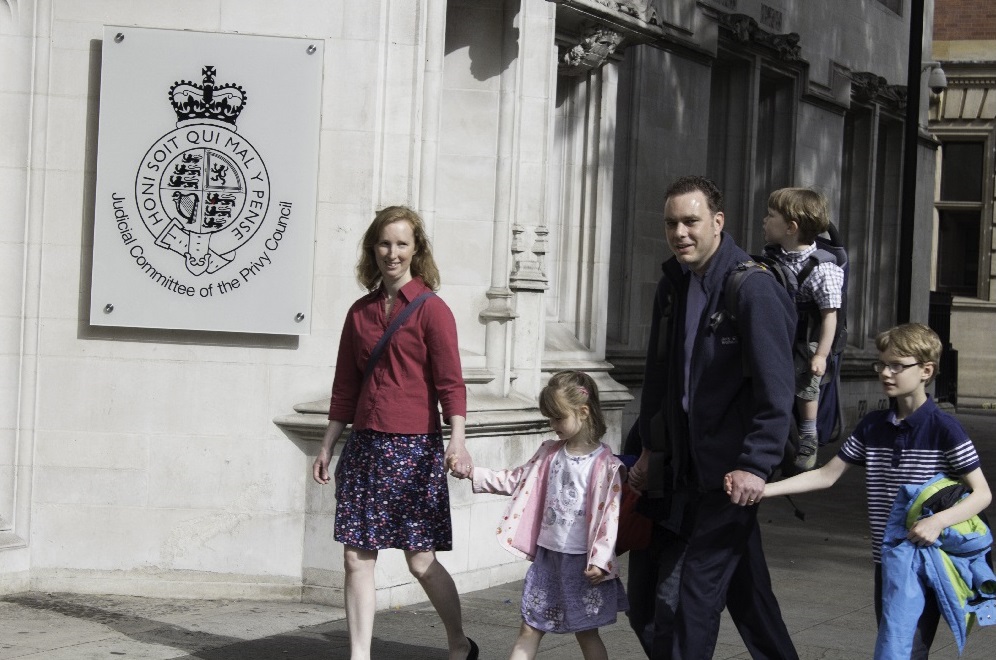
The controversial legislation has been condemned for breaching the human rights of families.
It is the first time the Supreme Court has prevented a major piece of legislation passed by the Scottish Parliament from coming into force.
Unanimous decision
In a historic verdict, five of the UK’s most senior judges, including two Scots, unanimously overturned decisions by the courts in Edinburgh on the legality of the Named Person provisions of the Children and Young People (Scotland) Act 2014.
The judges branded the law “defective” for breaching article 8 of the European Convention on Human Rights (ECHR), which guarantees everyone’s “right to a private and family life”.
They declared Holyrood had exceeded its powers by making a law which allowed public bodies to share sensitive private information about children and parents without consent.
The judges stated:
“The sharing of personal data between relevant public authorities is central to the role of the named person … the operation of the information sharing provisions will result in interferences with the rights protected by article 8 of the ECHR” (Para. 78). Because of the lack of safeguards “the overriding of confidentiality is likely often to be disproportionate” (Para. 100).
They concluded:
“…the information-sharing provisions of Part 4 of the Act are not within the legislative competence of the Scottish Parliament” (Para. 106).
“…since the defective provisions are not within the legislative competence of the Parliament, they cannot be brought into force.” (Para. 109)
NO2NP spokesman Simon Calvert, said:
“We are delighted with the decision, which proves our concerns, and those of the 35,000 people who signed our petition, were properly founded.
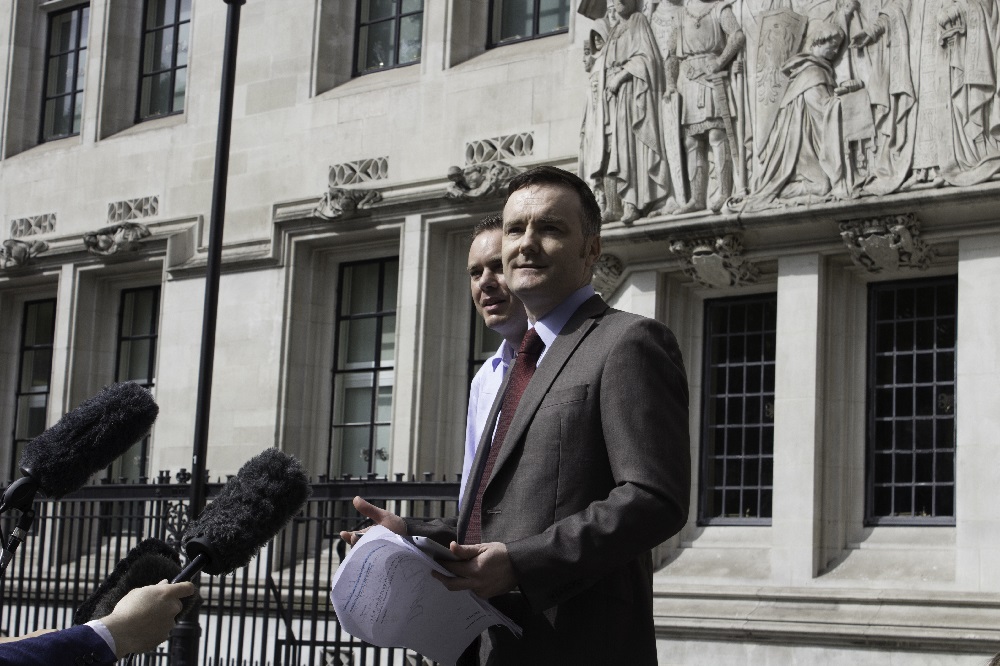
“This proposed scheme was intrusive, incomprehensible and illegal.
“This ruling means the Scottish Government has been blocked from implementing this scheme on August 31. It must scrap its plan for state snoopers with intrusive data sharing powers. It has to go back to the legislative drawing board if it wants to try again. But it would have to come up with a much more limited scheme that actually respects the rights of children and parents.”
“The Big Brother scheme is history.”
“It’s wonderful news for mums, dads and children all across Scotland who no longer have to worry about this unjustified invasion of their private lives. To many of them the Named Person scheme felt like a legal battering ram to gain access to their homes. The court has taken sides with ordinary families and put the Scottish Government back in its place.”
The judgment emphasises the importance of article 8. In a withering verdict on the Government flagship legislation, it said:
“The first thing that a totalitarian regime tries to do is to get at the children, to distance them from the subversive, varied influences of their families, and indoctrinate them in their rulers’ view of the world. Within limits, families must be left to bring up their children in their own way.” (Para. 73)
They also quoted from a US Supreme Court judgment which states:
“The child is not the mere creature of the state” (Para. 73).
To read the judgment or see the hand down visit the UK Supreme Court website.
NO2NP Roadshow roundup: Melrose, Broughty Ferry and Castle Douglas
Posted 10 years agoThe NO2NP Roadshow team has been really busy over the past week or so, clocking up three events in eight days (plus a great Action Day in between – more about that later in the week!). We’ve been responding to demand from various parts of the country to hold roadshow events in their area, so here’s a taste of what happened at these three venues:-

Melrose
Their first stop was the picturesque Borders town of Melrose on Monday night last week, when a good number of locals turned up to hear from the team.
Gordon Macdonald, Parliamentary Officer for CARE for Scotland, spoke about the reasons for the NO2NP campaign and referred to comments made online by Jim Terras, a Scottish Borders Council Training and Development Officer for Child Protection. Terras had remarked that he didn’t think the Government should be basing their opinions on the views of “fringe groups” opposed to the Named Person scheme, “who don’t really represent the general public”.

Gordon went on to point out that in a recent ComRes Poll, 64% of the Scots polled considered that the scheme was “unduly intrusive” into family life and 80% considered that the focus of child protection resources should be on truly vulnerable children and not every child.
We were then delighted to welcome Professor John Raven from Edinburgh to speak about his 50 years of academic experience in the areas of family, education and sociology. He said that parents are children’s most important educators in terms of instilling all the most important values in life, so having a Named Person to dictate what this should look like was quite wrong.
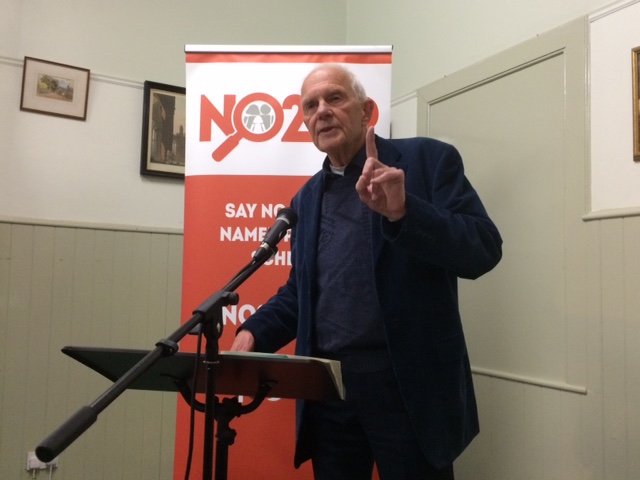
One of the things the Professor had noticed over his long career was the deprofessionalization of teachers, doctors and social workers by Government, who have increasingly imposed their own agenda on these professions. And now even parenting has been “deprofessionalized” under this scheme – in line with what is happening across society.
There was a lively Q&A, during which one mum asked the moving question: “Do the same people who failed my children so abysmally now think they can tell me they know better?”
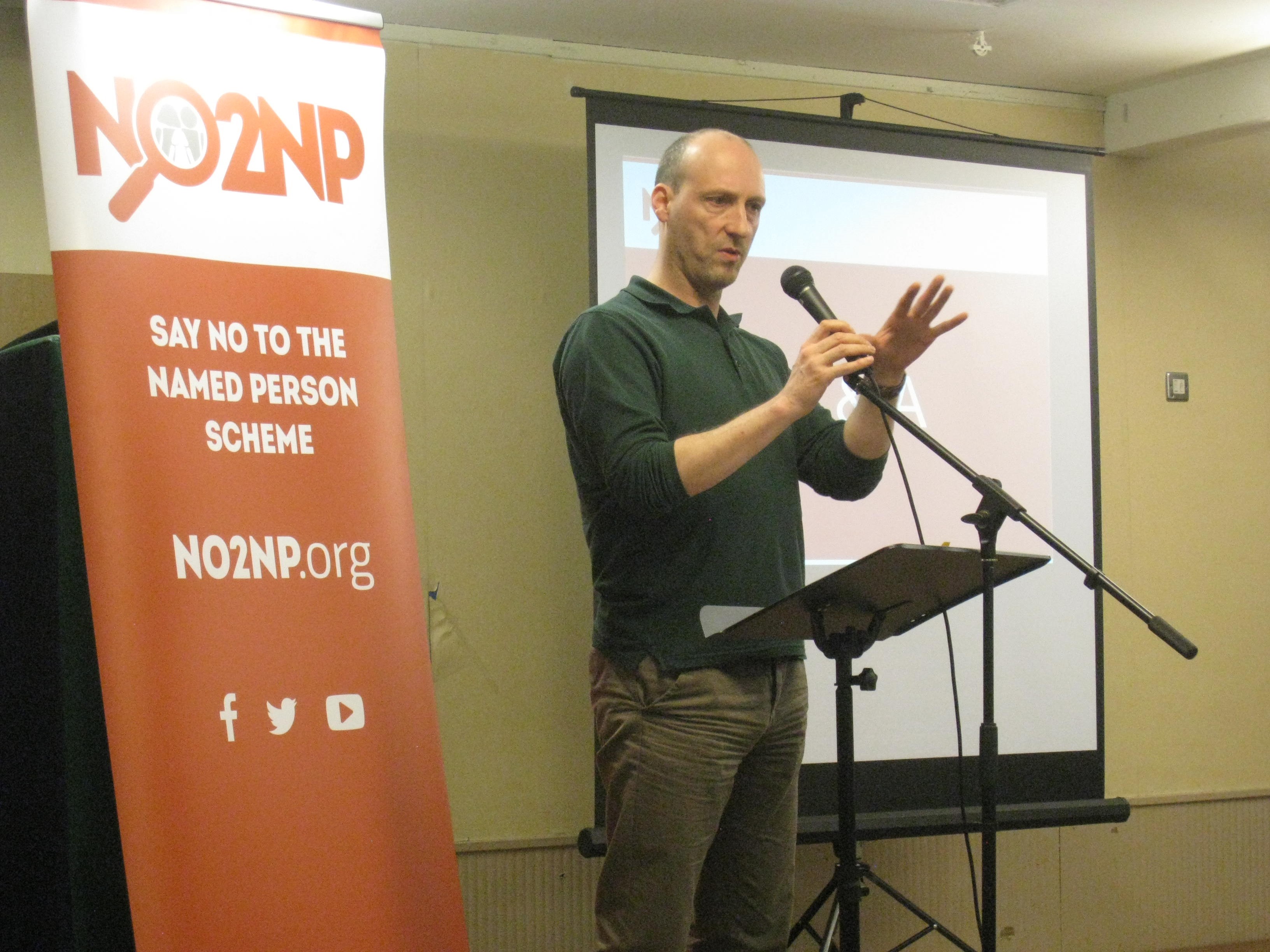
Broughty Ferry
The team’s next stop was Broughty Ferry last Friday to address a packed meeting at the town’s YMCA.
The meeting was chaired by Dr Stuart Waiton, a Sociology lecturer from Abertay University, who recently said that Tayside had some of the strongest opposition to the Named Person scheme. The passionate audience certainly had plenty to say, with one lady asking “What about the really vulnerable children? What will happen to them? They’ll go right down the list and be lost in the process!”
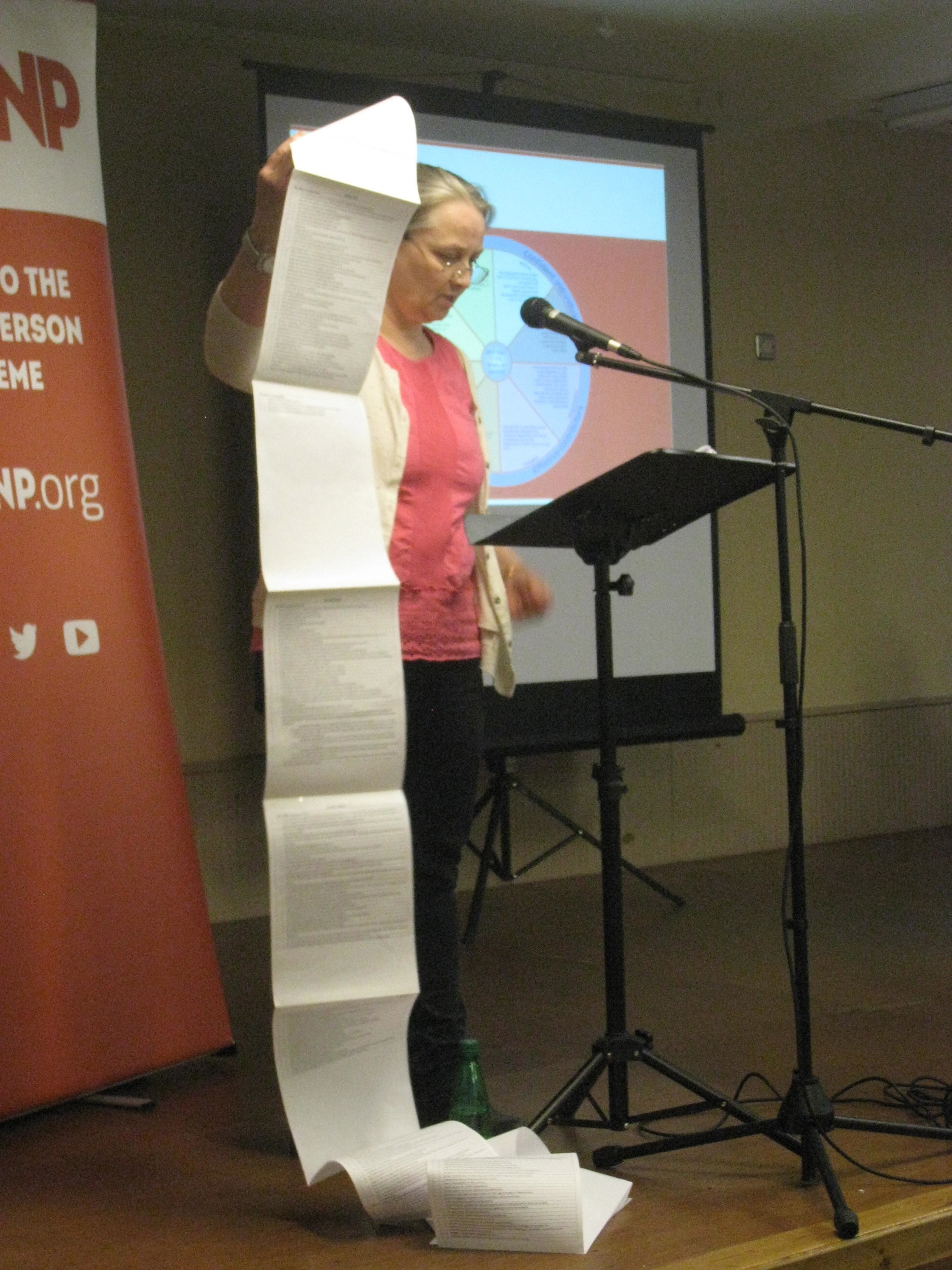
Lesley Scott from TYMES Trust set out how the Universal Health Visiting Pathway, due to be introduced on 31 August, will be a massive invasion of privacy for every young family in Scotland. A huge amount of sensitive information will be shared about their personal details, all intended to “promote, support and safeguard” the wellbeing of every child. However, the term “wellbeing” is nowhere defined in either the legislation or the guidance. This point was made in a video clip Lesley showed from a Holyrood debate last year, where an MSP in favour of Named Persons refused to answer a question about the definition of wellbeing, but instead ridiculed his colleague for asking the question.
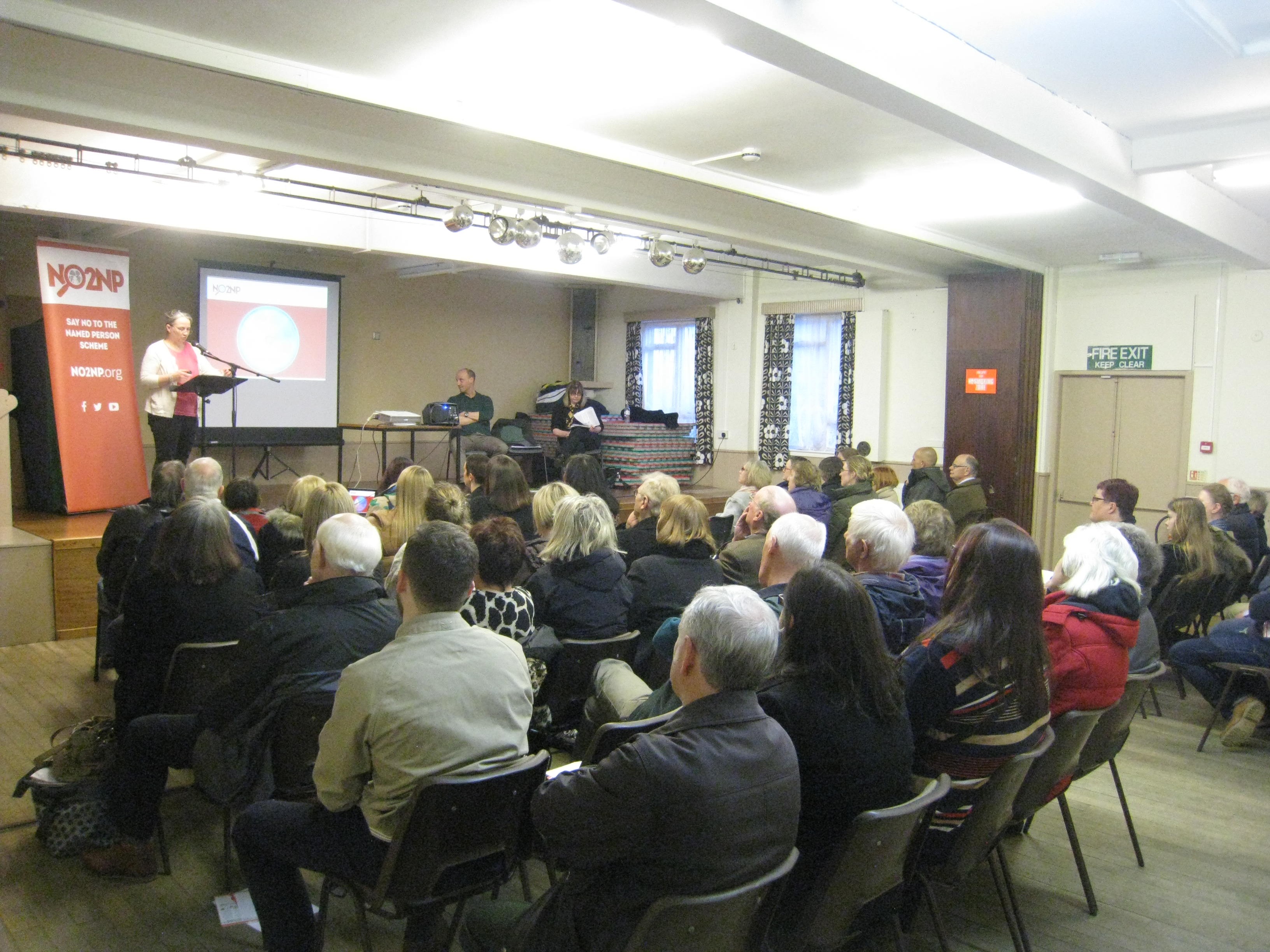
Lesley finished by saying: “Intervention is no longer about whether a child is at risk of significant harm, but rather whether the child is progressing in a manner the state regards as acceptable towards meeting outcomes set by the state.”
Alison Preuss from the Scottish Home Education Forum spoke about her background in elective home education and her experience in challenging breach of privacy law in various government schemes over the years.
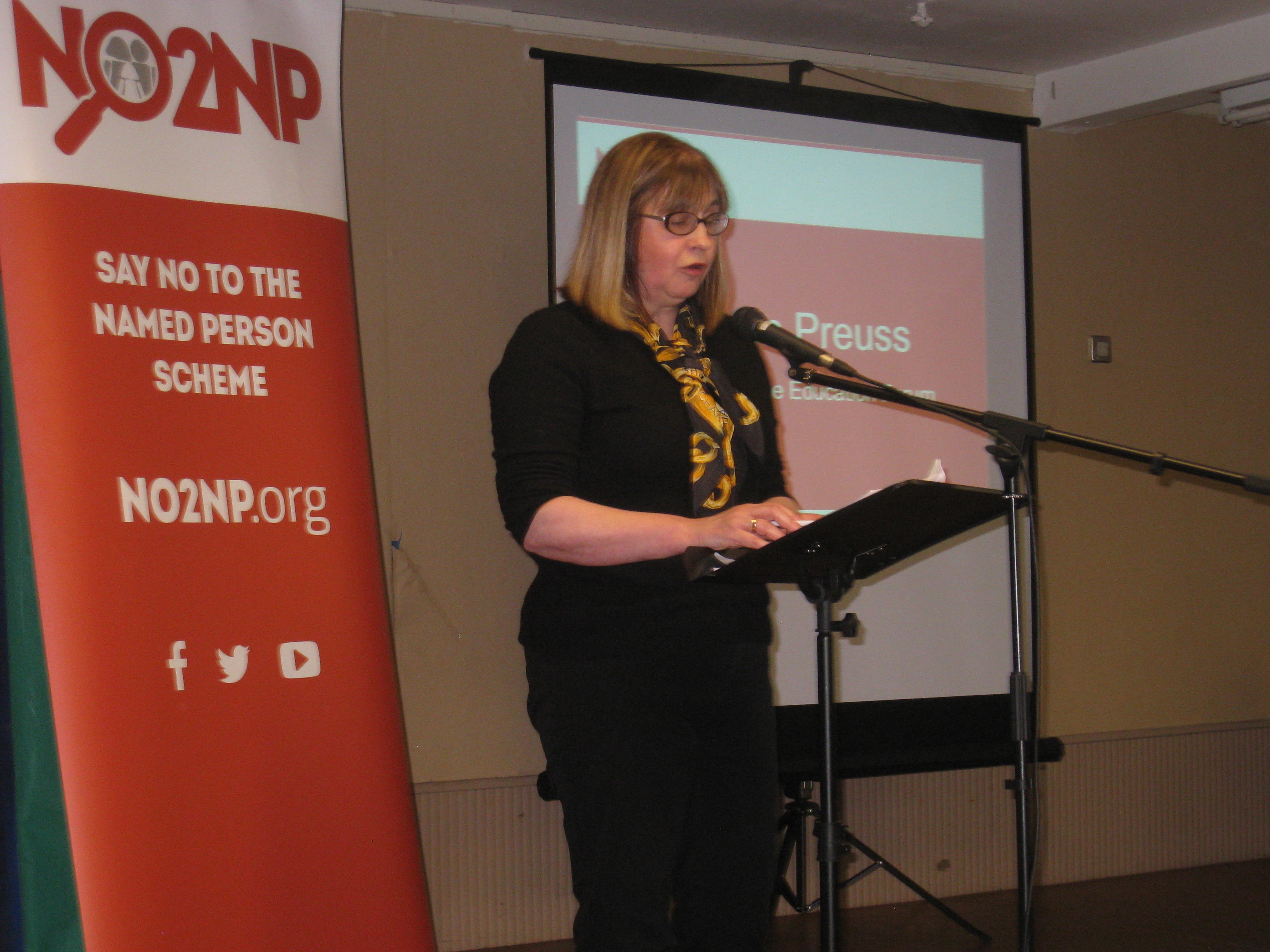
She made reference to the GIRFEC Cluedo article that appeared in the press recently. The aim of the game (used in training) is to get professionals to determine parents’ capacity to provide “wellbeing” by data mining without consent “at even the lowest level of concern”, as opposed to on child protection grounds. Alison went on: “Privacy is being systematically demolished on the basis of mere suspicion, allowing the state to call up a single view of any citizen at the click of a mouse, to more easily identify those of us in need of remediation”.
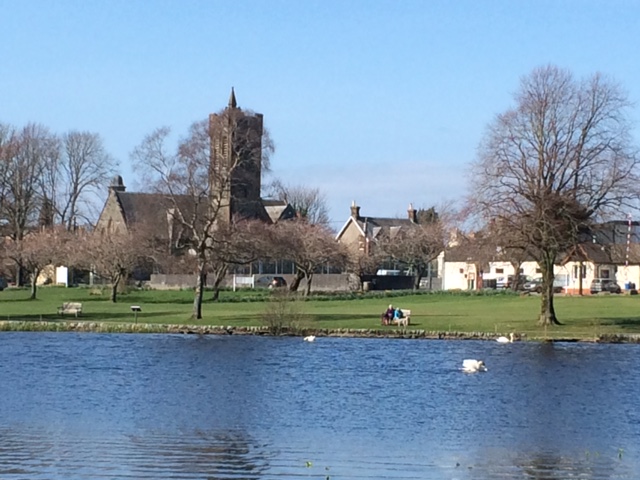
Castle Douglas
Then on Monday this week, the team traveled south to Castle Douglas, at the heart of scenic Dumfries and Galloway. The Christian Institute’s Nigel Kenny explained that one of the ways the Scottish Government planned to ‘teach’ young children the principles of “wellbeing” was by way of a snakes and ladders type game called On the Trail with the Wellbeing Snail.
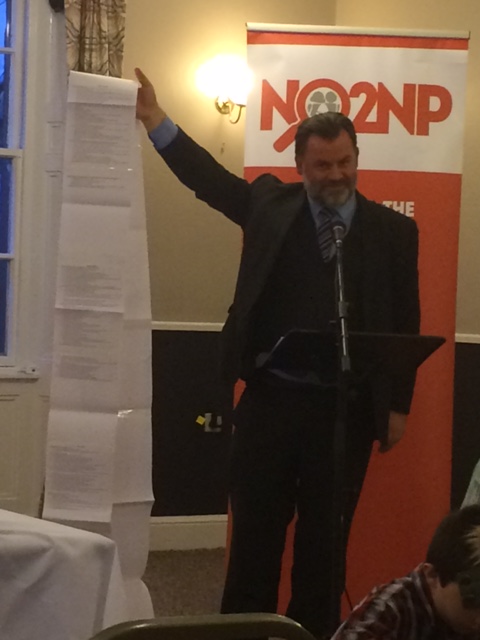
When Nigel explained that one of the cards for the game said that if you did not join the new after-school fencing club, you had to move back two spaces, one member of the audience asked us if we were making this up?! Not so, sadly. Others from the team mentioned the SHANARRI song and the GIRFEC Cluedo tool referred to earlier. The audience couldn’t believe that this was really happening! Nigel also pointed out that every named person would have to watch out for 222 risk indicators in each child or young person under their watch, which included: being under 5 years old, limited engagement by the parents and the parent having a different perception of the problem!
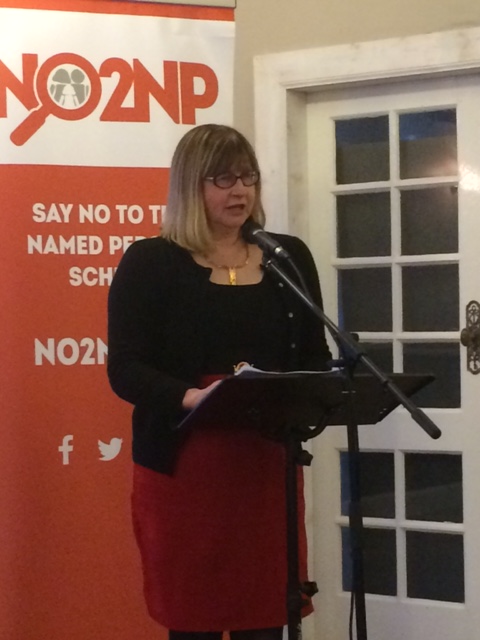
Alison Preuss said the acronym GIRFEC should really stand for Getting Information Recorded for Every Citizen. She pointed out that the principle of Named Persons was about being able to share sensitive data without the consent or even knowledge of the parents.
She highlighted datasharing concerns raised by a former UK Information Commissioner, Richard Thomas CBE, about an abandoned scheme similar to Named Persons, called ContactPoint. He said: “There are reasons why we need to promote better information sharing where children are at risk of harm, but whether the answer is to database every child in the country should be seriously questioned.”
Alison finished by quoting former US President Lyndon B Johnson, who once said: “You do not examine legislation in the light of the benefits it will convey if properly administered, but in the light of the wrongs it would do and the harms it would cause if improperly administered.” The Scottish Government failed to observe this principle, but NO2NP has been holding them to account throughout our campaign, highlighting the numerous problems with the legislation.
The NO2NP Team will be in Coatbridge on Wednesday next week. If you can join us, we look forward to meeting you!
NO2NP ROADSHOW: EDINBURGH
Posted 11 years agoThe large Salisbury Suite at the Macdonald Holyrood Hotel in Edinburgh was nearly filled to capacity on Tuesday morning for the first NO2NP Roadshow event since the summer break.
Dr Stuart Waiton of Abertay University in Dundee opened the meeting by saying that the autonomy of the family was being undermined by social policy across the board, with an overemphasis on “early intervention” by professionals to sort out children’s problems.
Liz Smith MSP then spoke about the huge mailbag she had received from people concerned about the scheme, which she says destroys the trust between families and professionals that is essential in bringing up a child.
She said that the scheme was “repugnant” and a “badly mistaken policy” that “diminishes resources”. The volume of support for the NO2NP campaign is growing all the time, with almost 12,000 people having now signed the petition. The appeal of the campaign “goes well beyond party politics” and the breadth of political views of those involved in it was “a good thing”.
She also pointed out that the bureaucracy of running the scheme would be enormous and too difficult to put into practice. The scheme has been “mis-sold” by the Government and the responses that concerned citizens have received have been “inaccurate” and “patronising”, she said. The Government, who are telling people how to live their lives, has not been shown in a good light, she added. In closing, Liz urged people to get involved, as it is “such an important campaign”.
Next up was Lesley Scott, Scottish representative for The Young ME Sufferers (TYMES) Trust.
She picked apart the three main arguments that have been used by the Scottish Government to justify the scheme:
1. “We’re doing all we can to help vulnerable children”
2. “We’re just formalising what we’ve been doing for ages”
3. “And Parents have asked for it.”
Lesley pointed out, firstly, that the word “vulnerable” does not appear anywhere in the legislation or the Government’s guidance and that their own QC admitted in the recent appeal case heard in the Inner House that every child is seen as potentially vulnerable. The corollary of this is that every parent is therefore viewed as potentially negligent or abusive. This will have a significant impact on how parents will be viewed and treated. If children, parents and associated adults do not agree with all of the Named Person’s views, then they will be treated as “non-engaging”: the balance has shifted dangerously in favour of the state.
The next argument – that local authorities are simply formalising what they have already been doing – has not been reflected in the attitudes of the professionals tasked with administering it, only a minority of whom think they currently have the capacity to gain an accurate and deep understanding of how to provide it.
And the contention that parents asked for the scheme is misleading at best, as parents with disabled children in the Highland region asked for a single, voluntary point of contact for accessing services. But that is not what they have got with the legislation and any success in the Highland Pathfinder has been shown to be down to other causes than the GIRFEC approach.
Lesley concluded by saying that the Government’s “disjointed excuses are shown to be a smokescreen and the true purpose of the legislation comes into view; it is a transfer of authority from your family to the state – an assault on the autonomous family unit”.
After a compelling new campaign video was shown, independent social work consultant Maggie Mellon spoke about her opposition to the scheme. She said that “parents are responsible for children’s upbringing, not services”, and that it is a very easy thing for professionals to display prejudice, when they don’t have the full picture. Civil servants have driven through this legislation but they haven’t thought through how dangerous it will be. People thought that they were getting a single point of contact, but that’s not what the legislation says. It doesn’t give parents or children the right to be consulted, as the Named Person is to take action “where he or she considers it to be appropriate to promote, support or safeguard the wellbeing of the child or young person”.
Commenting on the enormity of the universal scheme, Maggie remarked that “you can’t get all the sand on the beach through a little sieve”. A head teacher of a primary school isn’t going to have the time or the knowledge to explain your child’s needs to a range of professionals. Maggie said that she is against the Named Person scheme because “it’s wrong and it will cause damage”.
She said we should use the threat of compulsion far less than we do. She commented: “There’s too much compulsion and not enough compassion”. The Act moves the threshold from “at risk of significant harm” to “any concern about anything that might present a risk to a child’s wellbeing”. Instead of addressing the real needs of children, it is sinister surveillance. It’s not a point of contact for families to access services, she said, but a point for those services to access children. It’s as if the state is saying “We’re central, you’re peripheral”.
Nigel Kenny from The Christian Institute finished the formal session by taking everyone through the Action Packs that had been prepared for the meeting, before the usual lively Q&A finished off the meeting.
The next stop for the NO2NP Roadshow will be Glasgow on Monday 14th September at the Couper Institute, 86 Clarkston Road at 7.30pm – hope to see you there!
NO2NP ROADSHOW: GALASHIELS HIGHLIGHTS
Posted 11 years agoThe latest NO2NP Roadshow event was held on a beautiful, sunny evening in Galashiels last night.
Gordon Macdonald, who is CARE for Scotland’s Parliamentary Officer, spoke first. He said that the family is the fundamental unit in society and, as such, deserves respect. This respect for the family is “integral” to key human rights documents, but we have seen a reinterpretation of them in recent years which marginalises parents. The Named Person legislation is a really significant shift away from child welfare to a wellbeing model that is very vague and broad. We are seeing a fundamental shift in the ideology of how the state relates to all children, he explained.
Next up was Lesley Scott of TYMES Trust, who as usual highlighted what the local authority for the area was doing about the scheme. Borders Council has devised a “Cootie Catcher” so that children can learn how to assess their wellbeing. The Council has also created a snakes and ladders type game called “On the trail of the Wellbeing Snail”, where cards are selected when a player lands on a square that determines whether they make progress or go backwards.
Click the snail for more information

The notorious SHANARRI wellbeing indicators of safe, healthy, achieving, nurtured, active, respected, responsible and included are key to this game and are intended to show children when a “wellbeing outcome” has been achieved. Examples included whether a parent had washed their child’s gym kit the night before and whether a parent had listened to their child if they were upset.
Lesley went on to explain the Wellbeing Wheel, the My World triangle, the Resilience Matrix and Genogram, all part of the Scottish Government’s “toolkit” for assessing, analysing and addressing every child’s perceived “wellbeing” needs.
After Nigel Kenny from The Christian Institute brought everyone up to date about the judicial review appeal to the Inner House of the Court of Session last week, there was the usual lively Q&A, when those who had come raised a wide range of concerns about the scheme.
The NO2NP Roadshow will be calling at the Gracefield Arts Centre, Edinburgh Road, Dumfries next Wednesday, 17th June at 7.30pm – we look forward to seeing some of you there!
‘THIS IS WORSE THAN THE NANNY STATE’, QC TELLS COURT ON DAY 1 OF APPEAL
Posted 11 years agoYesterday, Aidan O’Neill QC, representing campaigners challenging the Named Person scheme, told Scotland’s highest court that the plan to give every child in Scotland a state guardian was “incompatible with the fundamental rights of a democratic society”.
O’Neill, a leading human rights expert, said the scheme created a situation “worse than a nanny state because the nanny is at least responsible to the family”.
He was speaking at the start of the appeal hearing by opponents of the Named Person legislation, after Lord Pentland rejected their initial bid last year.
During the appeal, in Edinburgh’s Court of Session, Mr O’Neill said the state should support the family in the upbringing of children as the family is the fundamental group unit of the state and entitled to state protection.
He said the Universal Declaration of Human Rights was written to counter Nazi and Fascist totalitarian states which placed value on “uniformity and conformity” and to point out that “the child is not the mere creature of the state”.
He told the court the scheme didn’t require families to give consent and offered no chance to opt in or out and said: “The presumption is every child needs a named person. That is wrong. The vast majority of parents bring up their children perfectly well. For the state to assume a responsibility for every child regardless of need or threat of harm is to go beyond what we properly expect from a democratic society that respects families and respects diversity.”
Based on the guidance issued by the Scottish Government he also drew attention to the fact that: “Not only can you not opt out of the scheme you have to positively co-operate with the named person otherwise you could be characterised as ‘hostile’ or ‘non-engaging’ which leads to further state involvement. ”
He said the compulsory nature of the law and the need to collate data on every child would result in “white noise” meaning “those who do need help get lost”.
Mr O’Neill recognised that there are conflicting issues between respect for the family and responsibility for the protection of children from harm. But he said there was no pressing social need requiring interference in the lives of every family and continued: “The overwhelming majority of children are not neglected and the Named Person scheme subverts family life and supplants parents.”
He said the scheme was drawn up to promote ‘wellbeing’ (which can include everything from mental health to a “wider vision of happiness”) among children but said: “That’s what parents do and have done through the ages. It’s not the state’s job.
“We accept there is a legitimate state interest in the protection of the vulnerable, but this is not just dealing with the vulnerable, it’s dealing with all children.
“Most families do not need the state to get involved. Some parents – a tiny minority – do cause harm to their children but that does not justify appointing a named person to every child.”
He said the central assumption behind the scheme is that “the state knows best” whereas families “are the breeding ground of diversity and individuality”.
The legal action is being brought by The Christian Institute, CARE, TYMES Trust and the Family Education Trust, with the support of academics and individual parents, all of which support the NO2NP campaign.
The appeal before Lord Carloway, Lord Malcolm and Lord Bracadale continues today with the Scottish Government’s response.
The Named Person scheme is part of the Children and Young People (Scotland) Act and is expected to be implemented nationwide in 2016.
NAMED PERSON APPEAL HEARING: Campaigners back in court today
Posted 11 years agoCampaigners opposing the Named Person scheme are back in court today for an appeal hearing after their legal challenge was rejected last year.
Lord Pentland rejected arguments that MSPs had exceeded their powers, breaching human rights rules and data protection laws, in a Judicial Review aimed at having the legislation overturned.
Now three judges will consider the proposals again.
The legal action is being brought by The Christian Institute, CARE, TYMES Trust and the Family Education Trust, with the support of academics and individual parents, all of which support the NO2NP campaign.
Community Law Advice Network (Clan Childlaw), a charity that provides legal help for children, also raised concerns about the scheme and announced it will intervene in the case.
Simon Calvert of The Christian Institute, said: “We’re asking the court to make a ruling that the imposition of a Named Person on every child in Scotland is unconstitutional and a breach of the right to a private family life.
He said they wanted the “court to look behind the Government’s rhetoric and see how this is not about protecting vulnerable children. It is about making the state a co-parent, with power to second-guess and over-ride parenting decisions about what makes a child happy. It’s Government-approved-parenting writ large”.
He added: “The trigger for intervention by the Named Person is not where there is a ‘risk of harm’. The threshold at which the Named Person can intervene in the lives of Scottish families is merely the ‘promotion of well-being’.
“The Named Person is, in effect, legally empowered to police the happiness of Scottish children. He can access and share their confidential medical data, their school records, he can question children and give them advice and supply services to them without their parents’ consent – all on the basis of what he thinks is most likely to make them happy. That is an outrage. Thousands of people across Scotland know it is an outrage, and that’s why they’ll all be hoping our judicial review succeeds.”
NO2NP Roadshow: Falkirk highlights
Posted 11 years agoFalkirk was the latest stop for the NO2NP Roadshow last night, when local supporters of the campaign were given the lowdown on the state guardian scheme.
Dr Stuart Waiton from Abertay University explained some of the key developments in social policy over the last 15 years in relation to child welfare. The concepts of abuse, vulnerability and early intervention have become deeply embedded in the minds of many strategists and there is a feeling that parents cannot advise their children properly without first receiving advice from professionals. This is known as “third way parenting”.
Lesley Scott, from TYMES Trust, pointed out that contrary to the contentions of Acting Minister for Children and Young People, Fiona McLeod, parents across the country did not ask for the Named Person scheme. Lesley went on to explain how the Scottish Government’s pilot of the scheme in the Highlands led to nearly 8,000 children (1 in 5) being put on a “child’s plan”.
During a lively Q&A session it was asked if teachers could opt out of being Named Persons. This was a very significant change in the terms and conditions of their employment, yet some of the teaching unions have yet to indicate their detailed views on this matter.
The Roadshow will be calling at the Elmwood Golf Club, Cupar at 7.30pm on Tuesday next week, when MSP Liz Smith hopes to be one of the speakers – do plan to join us, if you live in the area!
NO2NP Roadshow: Elgin highlights
Posted 11 years agoThe campaign saw strong support in Elgin last night as concerned parents and individuals, with some traveling quite a distance, turned out for the latest NO2NP Roadshow.
Nigel Kenny of The Christian Institute explained that the campaign was made up of a broad coalition of organisations and individuals from academia, charities, education, medicine, politics and social work. He said all those involved have a shared concern for the importance and autonomy of the family in raising the next generation.
Videos were shown, the first explaining the background to the campaign, and the second from First Minister’s Questions last week, when NO2NP supporter Liz Smith MSP challenged Nicola Sturgeon over Clan (Community Law Advice Network) Childlaw’s concerns about data sharing.
Lesley Scott from Tymes Trust then spoke about the blueprint for every child’s life that has been planned under the GIRFEC (Getting It Right For Every Child) model, including the Wellbeing Wheel, the My World Triangle and the Resilience Matrix. She pointed out that Edinburgh University had identified no fewer than 304 outcomes that could arise from the SHANARRI “wellbeing” indicators.
Nigel finished off the talks with an update on the judicial review appeal (due to be heard in Edinburgh on 3rd and 4th June) and some tips on how people can get involved with the campaign.
There was a lively and extended Q&A at the end, where people expressed their deep concerns about the negative impact that the scheme will have on families, schools and society at large.
The NO2NP Roadshow will be stopping off at Falkirk next on Wednesday 27th May, when we’ll be at the Best Western Park Hotel in Camelon Road at 7.30pm. Hope to see you there if you live in and around the area!
NO2NP Roadshow: Aberdeen highlights
Posted 11 years agoThe latest NO2NP Roadshow event was held in the Aberdeen Arts Centre on Monday (11th May), where one local woman’s run in with an emanation of the Named Person scheme at her daughter’s school was raised during Q&A as a matter of concern. Even more concern was expressed when it was revealed that a GP would be obliged to share confidential patient details about, for example, a mother’s struggle with depression with her child’s Named Person.
After a video was shown about the judicial review in the Court of Session, Abertay University sociology lecturer Dr Stuart Waiton spoke about the disjuncture between the people and the powerful and how, over the past century, children were no longer being seen in the context of their families and government was increasingly seeing its role as one of “risk management”.
Lesley Scott of Tymes Trust then made reference to the quote in a recent newspaper article by Acting Minister for Children and Young People that the Named Person legislation “is about making sure that we are doing everything in our power to protect vulnerable children.” Lesley then pointed out that the word ‘vulnerable’ does not appear anywhere in the legislation or in the draft statutory guidance. Instead, she said “this legislation is about measuring the wellbeing of each and every child.”
Some practical points on how people can be involved in helping the NO2NP campaign were then shared by Nigel Kenny of The Christian Institute, before a lively Q&A, always one of the high points of these Roadshows.
Our next event is in Elgin this coming Monday (18th May) at the Laighmoray Hotel, Maisondieu Road, Elgin, IV30 1QR at 7.30pm – please do come along and find out more about the campaign.
BBC Sunday Politics Scotland: Named Person debate
Posted 12 years agoThe Named Person issue was debated extensively on BBC Sunday Politics Scotland over the weekend, with presenter Gordon Brewer putting pressure on the Minister for Children and Young People, Aileen Campbell, to explain the need for this intrusive proposal.
Watch the clip
The Director of The Christian Institute, which is part of the NO2NP campaign, also took part in the discussion saying the Named Person scheme would make it much more difficult to target resources at vulnerable children.
Other guests on the show included Gavin Brown, a Conservative MSP, opposed to the legislation.
Lesley Scott, who represents a charity providing support services for families with children suffering from ME and whose own son suffers from ME, was also interviewed on the show about her concerns over the Named Person scheme. You can watch an interview she did with NO2NP here.
Colin Hart, Director of The Christian Institute, which is preparing to mount a Judicial Review, said: “The Scottish Government has passed a Bill which gives huge powers to Named Persons to advise and talk to children without their parents even knowing about it and without their consent. And it seems to me a sledge hammer to crack a nut.”
“The same state bodies will be involved in looking for all these families where there’s no issue at all, so instead of actually finding that needle in the haystack they are actually making that haystack much bigger. And that’s going to make it much more difficult to find the vulnerable children”.






